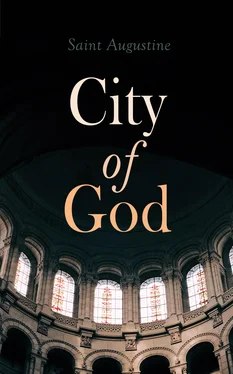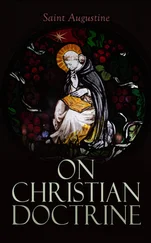3. Concerning the arguments which Nigidius the mathematician drew from the potter's wheel, in the question about the birth of twins.
It is to no purpose, therefore, that that famous fiction about the potter's wheel is brought forward, which tells of the answer which Nigidius is said to have given when he was perplexed with this question, and on account of which he was called Figulus .186 For, having whirled round the potter's wheel with all his strength, he marked it with ink, striking it twice with the utmost rapidity, so that the strokes seemed to fall on the very same part of it. Then, when the rotation had ceased, the marks which he had made were found upon the rim of the wheel at no small distance apart. Thus, said he, considering the great rapidity with which the celestial sphere revolves, even though twins were born with as short an interval between their births as there was between the strokes which I gave this wheel, that brief interval of time is equivalent to a very great distance in the celestial sphere. Hence, said he, come whatever dissimilitudes may be remarked in the habits and fortunes of twins. This argument is more fragile than the vessels which are fashioned by the rotation of that wheel. For if there is so much significance in the heavens which cannot be comprehended by observation of the constellations, that, in the case of twins, an inheritance may fall to the one and not to the other, why, in the case of others who are not twins, do they dare, having examined their constellations, to declare such things as pertain to that secret which no one can comprehend, and to attribute them to the precise moment of the birth of each individual? Now, if such predictions in connection with the natal hours of others who are not twins are to be vindicated on the ground that they are founded on the observation of more extended spaces in the heavens, whilst those very small moments of time which separated the births of twins, and correspond to minute portions of celestial space, are to be connected with trifling things about which the mathematicians are not wont to be consulted,—for who would consult them as to when he is to sit, when to walk abroad, when and on what he is to dine?—how can we be justified in so speaking, when we can point out such manifold diversity both in the habits, doings, and destinies of twins?
4. Concerning the twins Esau and Jacob, who were very unlike each other both in their character and actions.
In the time of the ancient fathers, to speak concerning illustrious persons, there were born two twin brothers, the one so immediately after the other, that the first took hold of the heel of the second. So great a difference existed in their lives and manners, so great a dissimilarity in their actions, so great a difference in their parents' love for them respectively, that the very contrast between them produced even a mutual hostile antipathy. Do we mean, when we say that they were so unlike each other, that when the one was walking the other was sitting, when the one was sleeping the other was waking,—which differences are such as are attributed to those minute portions of space which cannot be appreciated by those who note down the position of the stars which exists at the moment of one's birth, in order that the mathematicians may be consulted concerning it? One of these twins was for a long time a hired servant; the other never served. One of them was beloved by his mother; the other was not so. One of them lost that honour which was so much valued among their people; the other obtained it. And what shall we say of their wives, their children, and their possessions? How different they were in respect to all these! If, therefore, such things as these are connected with those minute intervals of time which elapse between the births of twins, and are not to be attributed to the constellations, wherefore are they predicted in the case of others from the examination of their constellations? And if, on the other hand, these things are said to be predicted, because they are connected, not with minute and inappreciable moments, but with intervals of time which can be observed and noted down, what purpose is that potter's wheel to serve in this matter, except it be to whirl round men who have hearts of clay, in order that they may be prevented from detecting the emptiness of the talk of the mathematicians?
5. In what manner the mathematicians are convicted of professing a vain science.
Do not those very persons whom the medical sagacity of Hippocrates led him to suspect to be twins, because their disease was observed by him to develope to its crisis and to subside again in the same time in each of them,—do not these, I say, serve as a sufficient refutation of those who wish to attribute to the influence of the stars that which was owing to a similarity of bodily constitution? For wherefore were they both sick of the same disease, and at the same time, and not the one after the other in the order of their birth? (for certainly they could not both be born at the same time.) Or, if the fact of their having been born at different times by no means necessarily implies that they must be sick at different times, why do they contend that the difference in the time of their births was the cause of their difference in other things? Why could they travel in foreign parts at different times, marry at different times, beget children at different times, and do many other things at different times, by reason of their having been born at different times, and yet could not, for the same reason, also be sick at different times? For if a difference in the moment of birth changed the horoscope, and occasioned dissimilarity in all other things, why has that simultaneousness which belonged to their conception remained in their attacks of sickness? Or, if the destinies of health are involved in the time of conception, but those of other things be said to be attached to the time of birth, they ought not to predict anything concerning health from examination of the constellations of birth, when the hour of conception is not also given, that its constellations may be inspected. But if they say that they predict attacks of sickness without examining the horoscope of conception, because these are indicated by the moments of birth, how could they inform either of these twins when he would be sick, from the horoscope of his birth, when the other also, who had not the same horoscope of birth, must of necessity fall sick at the same time? Again, I ask, if the distance of time between the births of twins is so great as to occasion a difference of their constellations on account of the difference of their horoscopes, and therefore of all the cardinal points to which so much influence is attributed, that even from such change there comes a difference of destiny, how is it possible that this should be so, since they cannot have been conceived at different times? Or, if two conceived at the same moment of time could have different destinies with respect to their births, why may not also two born at the same moment of time have different destinies for life and for death? For if the one moment in which both were conceived did not hinder that the one should be born before the other, why, if two are born at the same moment, should anything hinder them from dying at the same moment? If a simultaneous conception allows of twins being differently affected in the womb , why should not simultaneousness of birth allow of any two individuals having different fortunes in the world ? and thus would all the fictions of this art, or rather delusion, be swept away. What strange circumstance is this, that two children conceived at the same time, nay, at the same moment, under the same position of the stars, have different fates which bring them to different hours of birth, whilst two children, born of two different mothers, at the same moment of time, under one and the same position of the stars, cannot have different fates which shall conduct them by necessity to diverse manners of life and of death? Are they at conception as yet without destinies, because they can only have them if they be born? What, therefore, do they mean when they say that, if the hour of the conception be found, many things can be predicted by these astrologers? from which also arose that story which is reiterated by some, that a certain sage chose an hour in which to lie with his wife, in order to secure his begetting an illustrious son. From this opinion also came that answer of Posidonius, the great astrologer and also philosopher, concerning those twins who were attacked with sickness at the same time, namely, "That this had happened to them because they were conceived at the same time, and born at the same time." For certainly he added "conception," lest it should be said to him that they could not both be born at the same time, knowing that at any rate they must both have been conceived at the same time; wishing thus to show that he did not attribute the fact of their being similarly and simultaneously affected with sickness to the similarity of their bodily constitutions as its proximate cause, but that he held that even in respect of the similarity of their health, they were bound together by a sidereal connection. If, therefore, the time of conception has so much to do with the similarity of destinies, these same destinies ought not to be changed by the circumstances of birth; or, if the destinies of twins be said to be changed because they are born at different times, why should we not rather understand that they had been already changed in order that they might be born at different times? Does not, then, the will of men living in the world change the destinies of birth, when the order of birth can change the destinies they had at conception?
Читать дальше












